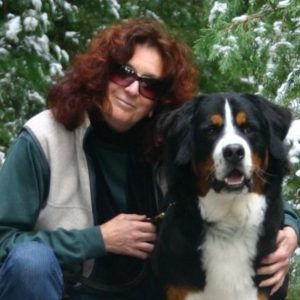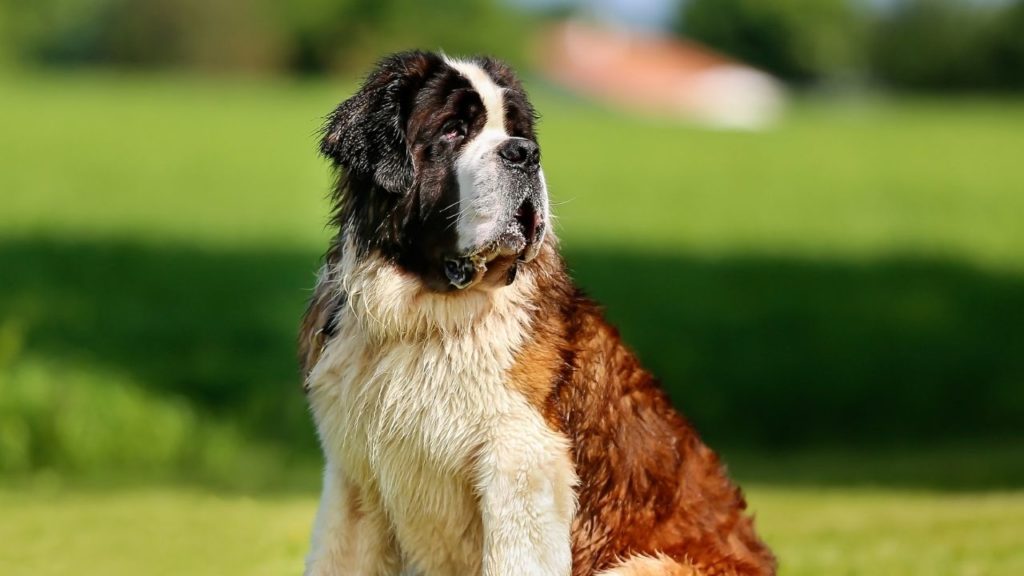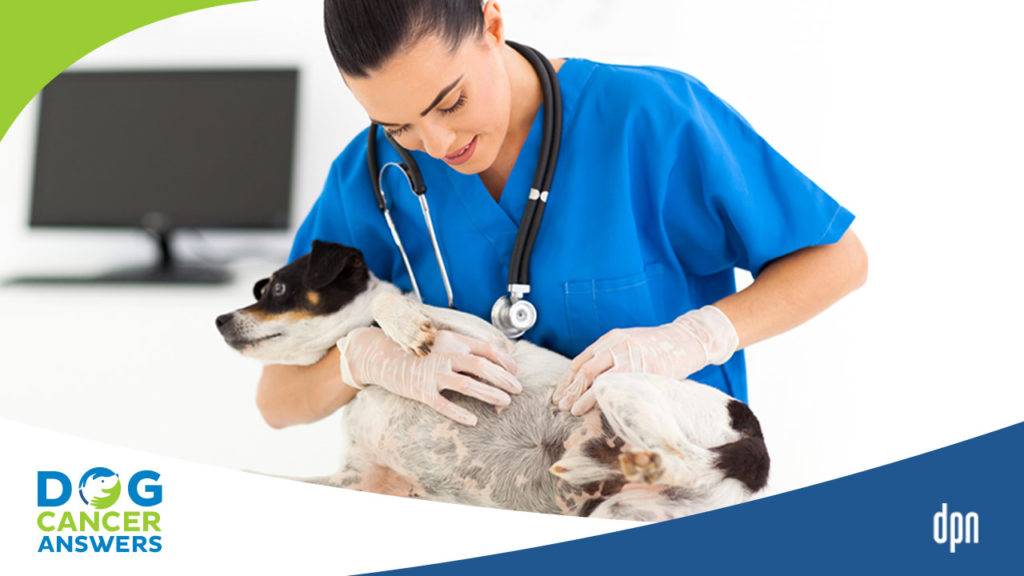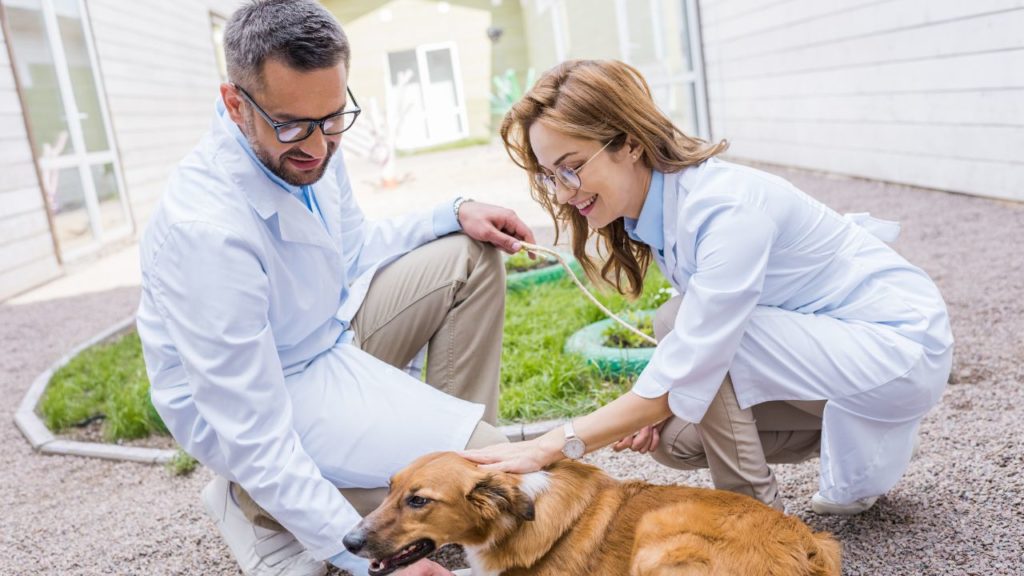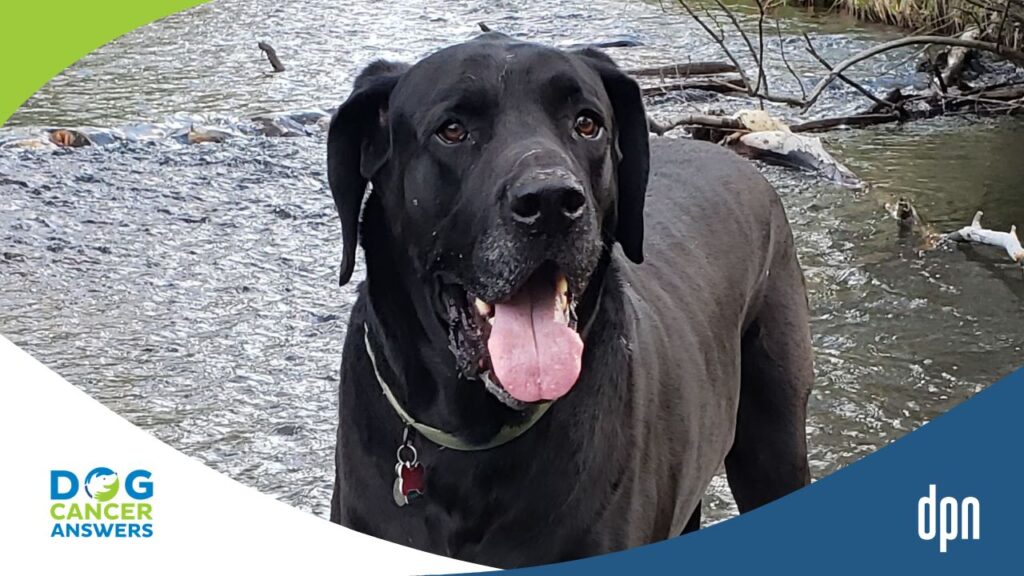EPISODE 198 | RELEASED January 9, 2023
How Tesoro Spent $60,000 on Dog Cancer Treatment | Diana Gerba
This True Tail includes almost every dog cancer treatment in the books and a whole lot of love shared by one woman and her special Bernese Mountain Dog.
SHOW NOTES
Tesoro was diagnosed with fibrosarcoma in Feb. of 2017 when he was 6.5 years old. Diana and Tesoro’s cancer fight lasted two years and cost $60,000. It was a journey with ups and downs, struggles and victories. Their fight was filled with love, laughter, and tears. It was a journey that unfortunately many other dog owners will travel. What lessons did she learn? What advice can she give? Diana hopes that the story of Tesoro’s fight as a Cancer Warrior can help others.
Listen in to hear the full story, from the treatments that Tesoro received to their amazing experience with Trupanion… and a little bit about designer cones of shame.
Links Mentioned in Today’s Show:
Bernese Mountain Dog Club of America https://www.bmdca.org/
SAGE Veterinary Centers https://www.sagecenters.com/
Trupanion Pet Insurance https://trupanion.com/
Berner-Garde Foundation http://www.bernergarde.org/home/
Torigen Pharmaceuticals https://www.torigen.com/
[00:00:00] >> Diana Gerba: I ended up taking these big cones and I painted like psychedelic colored flower petals all over them. He had one that was flowers. He had another one that was like a psychedelic beetle, you know, the name looked like. You know, so when people would see him, they’d smile and they go, oh, oh, how cute, and he’d wag his tail.
[00:00:22] >> Announcer: Welcome to Dog Cancer Answers, where we help you help your dog with cancer.
[00:00:28] >> Molly Jacobson: Hello, friend. Today on Dog Cancer Answers we have the most amazing true tale for you. Diana Gerba is joining us to talk about her Bernese Mountain Dog, Tesoro, who had quite a cancer journey. He racked up $60,000 in bills, and Diana got that all paid for by her insurance company.
So let’s talk to Diana now and bring her in to find out more about Tesoro’s journey and just how incredibly special this dog was. I know you’re gonna enjoy this true tale. Diana Gerba, thank you so much for joining us today.
[00:01:14] >> Diana Gerba: Yeah, it’s a pleasure to be here.
[00:01:15] >> Molly Jacobson: So your dog’s name was Tesoro?
[00:01:18] >> Diana Gerba: Correct.
[00:01:19] >> Molly Jacobson: And Tesoro has a special meaning in the Italian language, and it is?
[00:01:25] >> Diana Gerba: It means a treasure, and he was truly a treasure for me. You know, a very, very special Bernese Mountain Dog. And he came to me, actually, I had lost a puppy prior to that and his name was Donato. And I lost him to a death cap mushroom.
[00:01:43] >> Molly Jacobson: Oh.
[00:01:43] >> Diana Gerba: He was six months old.
[00:01:44] >> Molly Jacobson: Oh.
[00:01:45] >> Diana Gerba: And it was the same breeder, you know, we were devastated with the loss of this little boy. And you know, she had bred another girl and she was like, I don’t know if there’s gonna be puppies, I don’t know. And I’m like, I don’t know if I’m ready for one. You know? And then she called me and said, yes, yes. And I’m like, yeah, I am ready for one, I want this boy. You know? And there was all, she’s like, there’s gotta be one good one in there.
There’s gotta be one good boy. ‘Cause she knew uh that, you know, I really wanted to show, I wanted to take him to versatility, and there was only one boy in the litter and he was a pretty special guy.
[00:02:22] >> Molly Jacobson: And Tesoro was a Bernese Mountain Dog?
[00:02:25] >> Diana Gerba: Correct. Um.
[00:02:26] >> Molly Jacobson: Tell me a little bit about that breed and why you like it.
[00:02:28] >> Diana Gerba: I love that breed and I actually was in the breed for about 30, 32, 34 years. They are amazing dogs. Just absolutely amazing. They’re, you know, big loves, you know, they’re gorgeous looking. I remember when I saw my first one, I was just like, oh my God, I want to have one of these someday.
Like, oh, my word. You know, they’re beautiful tri-colors, the males are loving and strong, but cuddly and silly. They’re great with family. Just amazing dogs, you know, and they’re a working dog. I mean, all the things you can do with them – historically, you know, were known to be draft dogs and general farm dogs. So they’re supposed to be a little bit aloof with strangers. But, you know, mine never were. They were just very happy loves.
And they would pull, you know, for the farm, they would, in Switzerland, they would pull the, um, milk cans, you know, filled with milk down to the market, and then they would return back up the hill with the cheese. They were also drovers because in Switzerland the, the cows would slowly go up the mountains and so as drovers, you know, they weren’t herders so they didn’t, you know, go running around crazy. They would slowly move them up the mountains and they would move them back into, you know, the houses where they were supposed to be.
[00:03:44] >> Molly Jacobson: Just kind of encouraged the cows to go to the correct place.
[00:03:47] >> Diana Gerba: Yeah. And belonging to the Berner community, you know, and clubs here, we carried on the traditions of, you know, what they were bred to do. So Tesoro, you know, and all my Berners, you know, went through, we did obedience with them, but we also did draft with them, and they would pull carts and have draft tests. And a draft test is an amazing thing to do.
It’s a working relationship with your dog that is, you know, phenomenal to build because you would not only, you know, go through like a, a regular like obedience little pattern, but then they would hook up to a cart and you know, as a novice dog, you would be on lead and you would go through a course, a maneuvering course, which would entail going around things, going through a gate, closing the gate, you know, going through weaves.
You know, a sound, you know, a distractions, changing of pace, having someone come up and greet your dog, loading your cart, unloading your cart. So it’s a thing, it’s about 20, you know, it’s a good amount of time.
[00:04:47] >> Molly Jacobson: They have to really understand what the task is and they have to be able to focus on it.
[00:04:52] >> Diana Gerba: Right. And then they would go on a freight haul, which is a half mile freight haul, and they would have to pull, as a Novice Dog, pull 20 pounds in their cart. As a Draft Dog they would have to pull their weight rounded down to the-
[00:05:05] >> Molly Jacobson: Oh my goodness.
[00:05:05] >> Diana Gerba: -nearest tenth, so in their carts. So they might be pulling, you know, a hundred pounds.
[00:05:10] >> Molly Jacobson: How much was Tesoro?
[00:05:11] >> Diana Gerba: Tesoro was 108 pounds.
[00:05:13] >> Molly Jacobson: Oh wow.
[00:05:14] >> Diana Gerba: And so when he did – he did Novice, I never did the full Draft Dog with him. I only took him to Novice and was attempting to get to Master Novice, which is, um, when you have done the test five times. We didn’t make it to five times.
[00:05:29] >> Molly Jacobson: What happened?
[00:05:30] >> Diana Gerba: Well, let’s see, on my birthday actually, I noticed that his nose looked a little bit odd. And I’m like, hmm, looks a little strange. Why? And I’m like, looking at other dogs, I’m like, no, it really does look odd. So I made an appointment with my vet and I said, look at his nose. His nose seemed odd. And she looked and she lifted up his nose, you know, which was an exam that usually is not done, when they look at the mouth and look at the teeth, they’ll look at the teeth and under, but they don’t lift the nose up.
And when she did that, it seemed that it was definitely, there was something growing there.
[00:06:09] >> Molly Jacobson: Ugh. On his upper gum? Under the lip?
[00:06:12] >> Diana Gerba: Upper gum.
[00:06:13] >> Molly Jacobson: Yeah.
[00:06:13] >> Diana Gerba: I, and, and my vet was like, she’s just, no, I never do an exam like that. And so the next day they scheduled ’cause she says, I think we need to get a biopsy. We need to see what’s going on. And prior to doing, when I showed up the next morning, they did blood work, you know, to before they, you know, would do the operation. And when they did it, the calcium levels were really high. Like outrageously high. And so we are suspecting osteosarcoma and we’re like, holy moley, Batman, what are we facing here?
[00:06:41] >> Molly Jacobson: Right. Osteosarcoma on the muzzle would be really-
[00:06:44] >> Diana Gerba: Well, it would be really weird. But is, there with Berners who are known to have so many cancers, I mean the breed is a wonderful dog breed, but they have so many cancers.
[00:06:54] >> Molly Jacobson: Right.
[00:06:55] >> Diana Gerba: So they did the biopsy and then when they did that, they ended up pulling a couple of front teeth because they were very loose and into what was to be the tumor. And at that point it was, you need to go to a higher level, you need to go to an oncologist, you know. So we made the first appointment at the higher level at Sage.
You know, and the one reason, wanting to talk to you about this is there, there are things that when, you know, when you hear that with your dog that’s been your companion and your heart dog, your mind starts squirreling and you go, what, really, now what do I do?
[00:07:28] >> Molly Jacobson: Right.
[00:07:28] >> Diana Gerba: And so when going to the oncologist, one of the things I asked a good friend to come with me ’cause I said, you know, I’m probably not gonna hear everything.
[00:07:34] >> Molly Jacobson: Yeah, good idea.
[00:07:36] >> Diana Gerba: You know. So, you know, why don’t you come with. And she was a dog person and was like, yeah. So we went in and, you know, Tesoro was bouncing around full of energy. I mean, this dog.
[00:07:46] >> Molly Jacobson: How old was he at this point?
[00:07:48] >> Diana Gerba: He was six and a half.
[00:07:49] >> Molly Jacobson: Okay, so he was six when he was diagnosed?
[00:07:52] >> Diana Gerba: Yeah.
[00:07:53] >> Molly Jacobson: Okay.
[00:07:54] >> Diana Gerba: And when we went in, you know, the oncologist came out and – uh, Rebecca, wonderful woman, smart lady – and she’s looking at him and she’s looking at the results of everything. And, you know, I asked her, I said – another tip – I said, do you mind if I record this on my iPhone because I’m, again, I’m not gonna remember this, and even though –
[00:08:14] >> Molly Jacobson: Also a good idea.
[00:08:15] >> Diana Gerba: -my friend is here.
[00:08:17] >> Molly Jacobson: Right.
[00:08:17] >> Diana Gerba: You know? And she was like, of course. Absolutely.
[00:08:20] >> Molly Jacobson: Yeah.
[00:08:20] >> Diana Gerba: So she started looking and scratching her head, and I still was kind of like really freaked by the blood test results. And I was going to ask her, I want them rerun again because I’m like, I’m not buying this.
[00:08:38] >> Molly Jacobson: Okay.
[00:08:39] >> Diana Gerba: And you know, she’s looking through everything and looking at the dog and going, you know, his energy level and stuff, she says, I don’t like these results. I’d like to run this again and I wanna run these blood work tests again. And I’m looking at her and I’m going, okay darling, I like you.
[00:08:57] >> Molly Jacobson: Right.
[00:08:58] >> Diana Gerba: You’re thinking.
[00:08:58] >> Molly Jacobson: Right. Let’s double check this. Let’s get a second opinion, right? Sometimes things happen, mistakes can be made.
[00:09:05] >> Diana Gerba: So she’s like, are you fine with leaving him here, let me run this? I’m like, yep, I’ll go out to lunch, you know. So we, my friend went out to lunch, came back, and she’s like, we ran the test and we ran him on three different machines and what was done before was wrong.
[00:09:21] >> Molly Jacobson: Oh.
[00:09:22] >> Diana Gerba: Yeah. And she’s, I don’t know if their machine wasn’t calibrated, I don’t know if lab results got switched, but everything is fine. Those levels are all normal. There is nothing else. And they also did a full body scan and said, we’re not seeing anything else.
[00:09:36] >> Molly Jacobson: Okay.
[00:09:37] >> Diana Gerba: With Berners, we wanna know is there something else going on because that’s gonna help us decide what is the treatment going to be.
[00:09:43] >> Molly Jacobson: Sure.
[00:09:44] >> Diana Gerba: So at that point it was like, what are my options? Because he had the tumor, you know, underneath the nose. And she was like, the best chance is to operate and to take the tumor, which means that he is going to lose his upper jaw and he’s gonna lose his canines.
[00:10:01] >> Molly Jacobson: Right. And he’d already lost his two front teeth.
[00:10:03] >> Diana Gerba: He lost the two little teeth, but it was like they were going to cut, you know, a good portion of the jaw.
[00:10:09] >> Molly Jacobson: Yeah.
[00:10:10] >> Diana Gerba: The upper jaw. And she was like, she says his muzzle is big enough, the nose will probably drip down.
[00:10:16] >> Molly Jacobson: Uh huh.
[00:10:16] >> Diana Gerba: But if we get the whole thing, he should be fine.
[00:10:20] >> Molly Jacobson: Because they hadn’t seen any local invasion.
[00:10:23] >> Diana Gerba: Nope.
[00:10:23] >> Molly Jacobson: And they didn’t see any metastasis.
[00:10:25] >> Diana Gerba: No. So we’re like, okay, let’s go there. How much is this gonna cost? Unfortunately, the question that you’ll need to ask.
[00:10:34] >> Molly Jacobson: Of course. All of us need to ask it.
[00:10:36] >> Diana Gerba: But luckily, I mean, not luckily. I mean, you know, my last three dogs I’ve been with Trupanion Insurance.
[00:10:44] >> Molly Jacobson: Okay, so you already had insurance before.
[00:10:47] >> Diana Gerba: I had insurance on him from when he was eight weeks old.
[00:10:50] >> Molly Jacobson: Okay.
[00:10:51] >> Diana Gerba: I was like, alright. And at that point, Trupanion was still that you had to spend the money and, you know, and they would, you know, return.
[00:10:58] >> Molly Jacobson: They would reimburse you?
[00:10:59] >> Diana Gerba: Yeah,
[00:10:59] >> Molly Jacobson: Uh huh. Okay. So you just submit claims and then they would refund you, but you had to pay the cash upfront.
[00:11:05] >> Diana Gerba: Pay upfront, right.
[00:11:06] >> Molly Jacobson: They didn’t work directly with the doctor, with the veterinarian. They worked-
[00:11:09] >> Diana Gerba: Correct.
[00:11:09] >> Molly Jacobson: -with you. Okay.
[00:11:10] >> Diana Gerba: You know. So it was like, all right, you know, we had already spent like four, you know, the first place, and now we were up to like six and eight and nine, and it was like, alright, um.
[00:11:21] >> Molly Jacobson: Nine total, you’d already spent?
[00:11:22] >> Diana Gerba: We had spent six at the earlier and then this was gonna be another nine. And so we’re like, alright, go with it. And at that point I was scratching my head ’cause I’m like, well I don’t have that much liquid to throw right now. And my breeder was like – you know, ’cause I was in touch with her, and I really recommend people to stay in touch with their breeders.
Oh yeah. I mean, they are a source of information, you know, and they care. And so she told me, well you’ve got insurance. She was going to Crufts and she’s like, here I’m just gonna toss the money into your PayPal account. There you go.
[00:12:00] >> Molly Jacobson: That’s nice.
[00:12:01] >> Diana Gerba: Yeah, it was like mind-blowing. And by the time she got back from Crufts, you know, it was already back in her account because Trupanion does a really fast turnaround. I mean, they had it back to me within seven, eight days.
[00:12:12] >> Molly Jacobson: What? Really?
[00:12:13] >> Diana Gerba: Yeah. Yeah.
[00:12:14] >> Molly Jacobson: So can I just ask you about that? Like.
[00:12:18] >> Diana Gerba: You’re surprised, huh?
[00:12:20] >> Molly Jacobson: I’m very surprised. I just got a claim paid from like 18 months ago from my human health insurance company.
[00:12:26] >> Diana Gerba: Yeah, I mean, my dog had better insurance than I do. I mean-
[00:12:29] >> Molly Jacobson: Yeah.
[00:12:29] >> Diana Gerba: -honest to god Trupanion, I mean, they’re amazing.
[00:12:32] >> Molly Jacobson: So you’ve submitted, does it online, did you just like upload all of your vet bills and then they just PayPaled you your money? How does that work?
[00:12:39] >> Diana Gerba: It was, you know, I ended up, well I had, you know, let them know there was this surgery that was gonna occur and it was pre-approved. Yes.
[00:12:46] >> Molly Jacobson: Okay.
[00:12:46] >> Diana Gerba: You know, he has this, that needs to be done. You know, here is the bill. What, it’s the day that it was done, I paid it off at the hospital there, and then I got the form and we faxed the form right in, and in X amount of time it was flipped back into my bank account. And then I flipped it to my friend’s PayPal.
[00:13:05] >> Molly Jacobson: Auto deposit from Trupanion into your bank account.
[00:13:09] >> Diana Gerba: Correct.
[00:13:09] >> Molly Jacobson: That’s nice.
[00:13:11] >> Diana Gerba: And then it gets even better ’cause you know, it gets better then worse, you know, so.
[00:13:15] >> Molly Jacobson: Right.
[00:13:15] >> Diana Gerba: Um, you know, we did the surgery and, you know, it was, it was hard on him, but dogs are amazing and-
[00:13:23] >> Molly Jacobson: They are.
[00:13:23] >> Diana Gerba: You know, he had the big hoodie on and he needed to recover from that. But the bad news was when they went in, they said that they weren’t sure that they got clean margins.
[00:13:32] >> Molly Jacobson: Oh, no.
[00:13:33] >> Diana Gerba: And so it was, we were going to have to do radiation.
[00:13:37] >> Molly Jacobson: Oh.
[00:13:38] >> Diana Gerba: And so we ended up doing radiation and it was like through 19 days every other day.
[00:13:46] >> Molly Jacobson: Okay.
[00:13:46] >> Diana Gerba: I mean, we did, you know, an incredible amount of radiation. His skin held up, but we knew that it was going to break down at a point. And that was really hard on him, you know, when it started breaking down, it was really tough. He was wearing the big, you know, cone of shame.
[00:14:02] >> Molly Jacobson: Yeah.
[00:14:03] >> Diana Gerba: Um.
[00:14:04] >> Molly Jacobson: So was it the appointment, did he mind the appointments themselves?
[00:14:07] >> Diana Gerba: No, no. He loved the appointments. He would go in wagging his tail.
[00:14:11] >> Molly Jacobson: I’ve heard this, that dogs like radiation. They must give him lots of treats.
[00:14:16] >> Diana Gerba: I think he got, yeah, really good cookies or something, but he would go in wagging his tail. It was great and he loved all the people, they fussed over him, and it was fine with him. But it was the side effects that started breaking down, you know? And that was really hard. Uh, really hard. But the other kind of crazy thing was, you know, you have the big cone of shame. And when people see you with the cone of shame they come up and go, oh, is he okay?
[00:14:42] >> Molly Jacobson: Yeah. Right, right. Obviously not okay. He has a cone on.
[00:14:46] >> Diana Gerba: Yeah, but, um, and so I ended up taking these big cones and I painted like psychedelic colored flower petals all over them.
[00:14:54] >> Molly Jacobson: Ah.
[00:14:56] >> Diana Gerba: And he had one that was flowers. He had another one that was like a psychedelic beetle, meaning that he looked like, you know, so when people would see him, you know, I mean, they would be like, they’d smile and they’d go, oh, oh, how cute, you know, and he’d wag his tail. And so it didn’t, you know, the, the reaction that, you know, for him, that people saw him, gave him a smile and were laughing as opposed to, oh, you poor dog.
[00:15:24] >> Molly Jacobson: Right, right.
[00:15:25] >> Diana Gerba: So it, it helped me. It helped him. It helped them. And when we would go into Sage and to the vets, I mean, they always were like, oh my God, these are so great. You know, you gotta make these for everybody. They should be here.
[00:15:37] >> Molly Jacobson: What a great quality of life treatment to just.
[00:15:40] >> Diana Gerba: Yeah.
[00:15:41] >> Molly Jacobson: It seems so simple to decorate the cone of shame so that the dog associates it with extra fun greetings and lots of love. I love it.
[00:15:51] >> Diana Gerba: You know, we would get, uh, Christmas and stuff when we had to go in and it’s like, you know, he would wear, you know, the necklaces, you know, with, uh, he would have his cone on and stuff, and he’d have the necklaces with the light bulbs that would light up and stuff, you know. But it was, we were dealing with this horrible thing.
[00:16:06] >> Molly Jacobson: Yeah.
[00:16:06] >> Diana Gerba: But let’s put smiles out there.
[00:16:09] >> Molly Jacobson: Because there’s always something that is, not fun necessarily, but joyful.
[00:16:16] >> Diana Gerba: Yeah. It’s like.
[00:16:17] >> Molly Jacobson: Like dogs bring joy.
[00:16:18] >> Diana Gerba: Yeah.
[00:16:18] >> Molly Jacobson: Let them bring joy.
[00:16:19] >> Diana Gerba: Exactly. You know? And bring joy to them, you know?
[00:16:22] >> Molly Jacobson: Yeah.
[00:16:22] >> Diana Gerba: And smiles. And so.
[00:16:23] >> Molly Jacobson: I love this.
[00:16:24] >> Diana Gerba: And so it was like really looking to continue with a quality of life for him and a happiness.
[00:16:30] >> Molly Jacobson: How long was he wearing the cone of shame? Like how long did this go on?
[00:16:34] >> Diana Gerba: Well, he, he went, it was like all the time during the radiation treatment and then, you know, after when his skin broke down. So it was like another month after that.
[00:16:42] >> Molly Jacobson: Oh my goodness.
[00:16:43] >> Diana Gerba: So.
[00:16:43] >> Molly Jacobson: So 19 weeks straight, that would be about five months.
[00:16:46] >> Diana Gerba: Well, it wasn’t 19 weeks. It was 19, 19 days-
[00:16:48] >> Molly Jacobson: Treatments.
[00:16:49] >> Diana Gerba: -of treatment. And so he was wearing the cone of shame probably for almost two and a half, three months.
[00:16:53] >> Molly Jacobson: Okay.
[00:16:54] >> Diana Gerba: But you know, so after the radiation and things looked kind of good, you know, and we stepped back and, you know, his nose was tilted down, but, okay. And before that, you know, I was doing obedience with him and he’d already gotten his versatility title, which means he had gotten his CD and he had his one draft title. But we were training for the next level, but that was with, you know, when they would, they would go over the jump and they would have to carry the dumbbell.
[00:17:20] >> Molly Jacobson: Okay.
[00:17:20] >> Diana Gerba: You know when you throw the dumbbell.
[00:17:22] >> Molly Jacobson: In their mouth?
[00:17:23] >> Diana Gerba: Yeah. And they have to bring, bring the dumbbell back to you.
[00:17:27] >> Molly Jacobson: Okay.
[00:17:27] >> Diana Gerba: You know, and you would throw it over the jump and they would have to go retrieve it over the jump and come hold it over the jump and come back. And he had no upper canine teeth.
[00:17:34] >> Molly Jacobson: Oh.
[00:17:35] >> Diana Gerba: But we would go up to the training hall, you know, just because that was part of our routine. And one day I was like, well, okay. And so I had his dumbbell there and I was like, oh. So I just put him in a sit by me and I threw the dumbbell and he went flying out and picked it up and came back and sat in front of me holding that thing. And I’m like-
[00:17:54] >> Molly Jacobson: He was able to do it.
[00:17:55] >> Diana Gerba: Like, how can you do that with no teeth? Like, how’s that work? You know? And so I’m like, all right, well, well okay, for shits and giggles, let’s see what happens. And so I took the big jump out and I’m like, okay, let’s throw it over the jump. And so I threw the thing and he went flying out over the jump. He always loved to go over the jumps. Went over the jump, picked up that dumbbell, came flying back over the jump, still holding it in his mouth. I’m like, how do you do that? You know? So it was like, okay, honey pie. You know, we’re gonna keep doing whatever we do.
[00:18:28] >> Molly Jacobson: Yeah. He’s like, you’re limiting me.
[00:18:31] >> Diana Gerba: Yeah.
[00:18:32] >> Molly Jacobson: Let me pick up the dumbbell. I’d like to do it.
[00:18:34] >> Diana Gerba: I know. So it was like, okay. You know, so we, you know, continued to compete a little bit, you know, we were still doing draft work and we’d go on our trips and stuff. And, um, by that point he was a veteran, you know, when dog reaches seven years old, they’re a veteran.
[00:18:50] >> Molly Jacobson: Okay.
[00:18:50] >> Diana Gerba: And so I showed him at regional specialties in veterans. And so, I mean, and the judge, I mean, I remember going in one time and the judge looked at him and went, oh my God. You know? And I’m like, he’s happy, please smile. You know? And she’s like, yeah, you know, she says, he’s amazing, he’s gorgeous, it’s just, what happened? But he’s so’s gorgeous.
[00:19:10] >> Molly Jacobson: So was his nose like really hanging? It was very obvious?
[00:19:14] >> Diana Gerba: Oh yeah.
[00:19:14] >> Molly Jacobson: Anybody looking at- oh. So.
[00:19:15] >> Diana Gerba: It was like a snoot. Yeah.
[00:19:17] >> Molly Jacobson: Oh, it was really hanging down at an angle.
[00:19:20] >> Diana Gerba: It, it didn’t bother him eating wise, I mean, you know, didn’t-
[00:19:24] >> Molly Jacobson: He totally adapted to it.
[00:19:25] >> Diana Gerba: Totally. I mean, dogs are amazing.
[00:19:27] >> Molly Jacobson: Yeah.
[00:19:27] >> Diana Gerba: We would be whining and crying and-
[00:19:29] >> Molly Jacobson: Oh, yeah.
[00:19:29] >> Diana Gerba: -you know, hiding in a corner.
[00:19:30] >> Molly Jacobson: I’d, I’d be in bed for, for years.
[00:19:33] >> Diana Gerba: Yeah. You know, they figure out, it’s like, okay, that’s what it is now.
[00:19:36] >> Molly Jacobson: Right, right. This is how I live now, oh well, I can still carry the dumbbell.
[00:19:41] >> Diana Gerba: Right, you know? So we kept going and then, um, but we would go back for checks to Sage. And we went back one time right before Thanksgiving and they were looking and they were like, I think we need to do another biopsy, ’cause they think it was back. And it did come back. And so it was like, okay, shit, now what? And I’m like, no more radiation. You know, she was like, yeah. And I said, there’s no more operating. I mean, we’re not taking any more off this dog. Um.
[00:20:10] >> Molly Jacobson: Were you worried about the surgery, the side effects, or like wind up?
[00:20:15] >> Diana Gerba: It was quality of life at that point. I mean-
[00:20:17] >> Molly Jacobson: Okay.
[00:20:17] >> Diana Gerba: -it was like if you cut more off that upper jaw, it was like, this is getting, no, we’re not going there.
[00:20:23] >> Molly Jacobson: Okay.
[00:20:24] >> Diana Gerba: You know, and the radiation, that was so hard on him, I’m like, I don’t think I could put him through that again.
[00:20:30] >> Molly Jacobson: Okay Diana, hold that thought right there while we take a short break to hear from our sponsors.
And we’re back with Diana Gerba.
Just to make sure that I understand – I’m not doubting that the radiation was hard on him, but what was hard about it? That’s one of the things people often wonder about radiation.
[00:20:50] >> Diana Gerba: Okay. So what happened on his face was the skin sloughed off.
[00:20:54] >> Molly Jacobson: Okay.
[00:20:54] >> Diana Gerba: And it sloughed off inside the nostrils also.
[00:20:57] >> Molly Jacobson: Oh.
[00:20:58] >> Diana Gerba: So it got very like gooky and all around his nose. So it was very hard for him at points in time to breathe.
[00:21:04] >> Molly Jacobson: Oh.
[00:21:05] >> Diana Gerba: And, and so.
[00:21:06] >> Molly Jacobson: Because he was just being flooded with kind of sloughing skin.
[00:21:09] >> Diana Gerba: Right. And so it was like cleaning this off of him. And he was on different pain meds through that whole time. I mean, his, the pill regimen was ridiculous, it was huge, to keep him calm and – ’cause he was, remember Tesoro.
[00:21:25] >> Molly Jacobson: Right, right. He wanted to run around. He didn’t care if his nose was falling off.
[00:21:29] >> Diana Gerba: You know, and but him, for him to be, you know, be comfortable, it was hard. At that point, I also started feeding, well, I fed raw all the time and the, the veterinarians were concerned about that. And I talked to, you know, who I dealt with with raw. I did not have bone in my raw, I had eggshells, and she’s like, you can cook all this. So we, at that point, we changed him to cooked meals so that he was still on the same kind of protein it was just-
[00:21:57] >> Molly Jacobson: So same, same diet, but you cooked it.
[00:21:59] >> Diana Gerba: Right.
[00:21:59] >> Molly Jacobson: Okay.
[00:22:00] >> Diana Gerba: Right.
[00:22:00] >> Molly Jacobson: And this is when the fibrosarcoma came back you started that?
[00:22:03] >> Diana Gerba: Well, no, I-
[00:22:04] >> Molly Jacobson: Or did you start that earlier.
[00:22:05] >> Diana Gerba: Earlier. All through whatever, you know, the operation and stuff, we moved over to cooked food.
[00:22:10] >> Molly Jacobson: Makes sense.
[00:22:11] >> Diana Gerba: You know, um, because, you know, who knows?
[00:22:13] >> Molly Jacobson: Yes.
[00:22:14] >> Diana Gerba: So the radiation and with the pain levels and stuff what was going on. After we had cleared through radiation, I ended up going to a holistic vet also.
[00:22:23] >> Molly Jacobson: Okay.
[00:22:23] >> Diana Gerba: You know, ’cause it was like, let’s go on both sides of the coin, you know?
[00:22:27] >> Molly Jacobson: Right.
[00:22:27] >> Diana Gerba: And, you know, talked to the people at Sage and said, you know, here’s the people here. And especially when we got back into that it had come back again, it was like, okay. I want you guys to talk to each other.
[00:22:39] >> Molly Jacobson: Oh.
[00:22:39] >> Diana Gerba: So everybody knows what everybody is taking and giving, so we don’t have any conflicts, you know, with any kind of medication. It’s like, this is what everything is. So whenever I would go to the holistic vet, I would take up all the meds and say, this is what, you know, he’s on. And when I would go back to Sage, I would show, this is what, you know, they’ve got for me. And then we also went on giving him a marijuana also.
[00:23:05] >> Molly Jacobson: Uh huh.
[00:23:05] >> Diana Gerba: You know, so he had CBD oil and it was an increasing dosage, so it was, you know, pretty hefty.
[00:23:12] >> Molly Jacobson: Is that legal in your state?
[00:23:13] >> Diana Gerba: It’s legal in California.
[00:23:15] >> Molly Jacobson: Okay.
[00:23:15] >> Diana Gerba: So here’s the other kind of little craziness. So, at that point, I mean, I had all these supplements and I called Trupanion and they were like, oh yeah, we pay for all the supplements.
[00:23:25] >> Molly Jacobson: Oh!
[00:23:26] >> Diana Gerba: 90%. 90%, you know, they covered all the supplements. I was like, okay.
[00:23:31] >> Molly Jacobson: What? Did you submit all of your receipts going back?
[00:23:34] >> Diana Gerba: Yeah. And they covered them all.
[00:23:35] >> Molly Jacobson: And they covered them? Oh my goodness. My next dog we’re getting pet insurance.
[00:23:41] >> Diana Gerba: Yeah. I mean, it is like, it’s crazy not to, especially, you know, with a Bernese Mountain Dog. I mean, especially with a Berner. Now for a Berner it costs more, you know, because they have a higher incident rate. But I must go back to, okay, when we were doing the radiation, at that point Trupanion changed, you know, how they dealt with submissions. So when we were doing the radiation, it was vet would just bill directly to Trupanion. I didn’t have to put the money upfront anymore.
[00:24:11] >> Molly Jacobson: Oh, that’s nice.
[00:24:11] >> Diana Gerba: I would just have to pay my 10%.
[00:24:14] >> Molly Jacobson: So you had to submit for the surgery, but then when it came to radiation, they had changed the policy and they paid?
[00:24:19] >> Diana Gerba: Right.
[00:24:19] >> Molly Jacobson: They worked directly with the vet.
[00:24:21] >> Diana Gerba: Right.
[00:24:21] >> Molly Jacobson: Right.
[00:24:22] >> Diana Gerba: And so not all vets do they, you know, I mean, the vet has to be able to, I guess they have the agreement with Trupanion that they will do that-
[00:24:29] >> Molly Jacobson: They’re in network.
[00:24:30] >> Diana Gerba: -deal with it in that way. Yeah, in network. Correct. You know, but they did, which was just a Godsend to me. The radiation was expensive. Then after when they found it again, we were like, okay, you know, what are we going to do? And I went on to Google. I mean, I’m like looking, you know, what else can I do?
[00:24:50] >> Molly Jacobson: Right.
[00:24:50] >> Diana Gerba: And I found this company Torigen, who does immunotherapy. And this was back, they had just kind of started. So I called them and talked with the head of the company and said, this is what my dog has, you know, blah, blah, blah. And she’s like, yeah, wish we could have gotten the tumor because they could have used that. Um.
[00:25:11] >> Molly Jacobson: Because they target based on the genetics of the tumor.
[00:25:15] >> Diana Gerba: Tumor. Correct.
[00:25:16] >> Molly Jacobson: Okay.
[00:25:17] >> Diana Gerba: Correct. So I had Torigen talk to my vet and my surgeon, oncologist and surgeon, and they said, okay, well what we’ll do is we’ll pull a biopsy plug and we’ll send the biopsy plug to Torigen. Okay. So I called Trupanion and said, you know, it’s a new treatment, um, you know, and I sent them stuff and they’re on the phone and they’re looking and she goes and talks to their people and comes back, she says, no, this is a treatment and um, we’ll pay. We’ll cover it.
[00:25:47] >> Molly Jacobson: So I wanna just make a disclaimer. We are not being sponsored by Trupanion.
[00:25:53] >> Diana Gerba: Right.
[00:25:53] >> Molly Jacobson: We have no financial relationship with Trupanion. Trupanion is not sponsoring, this is all just Diana’s story that is true life, like a true tale about Tesoro and fibrosarcoma and Trupanion really coming through for you.
[00:26:13] >> Diana Gerba: They were amazing. Okay. So, I mean, they were like, yeah, we’ll do that. And so when I told ’em about the, you know, Torigen, I was like, well, out of curiosity, he’s also on this marijuana and you know, the marijuana is costing, you know?
[00:26:29] >> Molly Jacobson: Yeah.
[00:26:30] >> Diana Gerba: And it’s about, I know it was like each month it was about 200 bucks, $250 every three weeks to four weeks.
[00:26:37] >> Molly Jacobson: Because it’s still, you’re still dosing it based on weight, right? And he’s 108 pounds, so you’re always spending more money on a 108 pound dog than, you know, we were spending on our eight pound dog. Right?
[00:26:50] >> Diana Gerba: Right. Exactly.
[00:26:51] >> Molly Jacobson: Right.
[00:26:52] >> Diana Gerba: You know, and so they asked me, is it legal in your state.
[00:26:55] >> Molly Jacobson: Uh huh.
[00:26:55] >> Diana Gerba: And I said, yes. And they’re like, okay.
[00:26:59] >> Molly Jacobson: Then we cover it?
[00:27:01] >> Diana Gerba: Correct.
[00:27:02] >> Molly Jacobson: Oh my goodness.
[00:27:03] >> Diana Gerba: Yeah, so it was like-
[00:27:07] >> Molly Jacobson: Now is that because it was prescribed by your veterinarian?
[00:27:10] >> Diana Gerba: It was prescribed by my holistic veterinarian.
[00:27:13] >> Molly Jacobson: So as long as a veterinarian was prescribing it, they were covering it, it sounds like?
[00:27:17] >> Diana Gerba: Yep.
[00:27:18] >> Molly Jacobson: Okay.
[00:27:18] >> Diana Gerba: So we just went on that path and you know, we did the plug and, you know, it seemed to, you know, the immunotherapy, and we would go down for, he had to have, I think it was like, it was like three shots or something. And so we, we did that and we’d go for a while and things were refined and then, you know, I’d go back again and notice there was a little bit like the bump on the side, you know, and they would look again. And we called Torigen and said, should we do another?
And they were like, we don’t know, it, with the road that we’re on, but sure. So we did.
[00:27:54] >> Molly Jacobson: What was that timeline from when you first started the Torigen treatments to this fourth, it sounds like a fourth shot?
[00:28:01] >> Diana Gerba: Um, I’m trying to remember. You know, basically is he fought for two years.
[00:28:05] >> Molly Jacobson: Okay. Two years from diagnosis?
[00:28:08] >> Diana Gerba: Two years from diagnosis. I know. Which, if you look back as to what, you know most, he had much longer. And in that two year time, you know, as I said, you know, we showed in veterans at two regional specialties. You know, went down to Palm Springs with him and showed in Palm Springs at the show. We went to three more draft tests and he passed three more draft tests, one of which was, you know, bless his heart, it was pouring rain at my friend’s house. I mean, just, and you know, as working dogs, you go out in the rain.
[00:28:40] >> Molly Jacobson: That’s right. You work.
[00:28:41] >> Diana Gerba: The farmers went out in the rain.
[00:28:42] >> Molly Jacobson: Right.
[00:28:43] >> Diana Gerba: You did it. You know, so the draft test, I mean, it was pouring. And we’re out there doing our obedience and doing our maneuvering thing, and at one point the wind picked up and it blew one of the canopies into the ring, and he just held his ground. He stood there and did what his job was supposed to do. You know, someone’s coffee cup and hamburger bun went flying by him and he still did his job, like, okay, whatever work, I’m working.
[00:29:11] >> Molly Jacobson: Oh wow.
[00:29:13] >> Diana Gerba: After the maneuvering when you have to do a long down and all the dogs line up and they do a long down and their owners go, you know, on the other side of the ring and you sit there and it’s a three minute down stay. And there were like eight dogs in the ring.
[00:29:27] >> Molly Jacobson: So that means, for people who don’t do this kind of training, because I can’t even imagine this. So you go to the – you say sit and stay, and then you walk away and go very far away and wait three and a half minutes?
[00:29:40] >> Diana Gerba: Three minutes. Yeah.
[00:29:41] >> Molly Jacobson: Three minutes. And the dog stays.
[00:29:44] >> Diana Gerba: Yeah.
[00:29:44] >> Molly Jacobson: Okay.
[00:29:45] >> Diana Gerba: And so they’re supposed to be in a down, not in a sit. Or actually they could be in a sit or a down, but they can’t change the position.
[00:29:51] >> Molly Jacobson: They can’t change whatever position you left them in. They don’t move.
[00:29:54] >> Diana Gerba: Right. You know, and so we’re slowly seeing all these other dogs getting up, you know, and I’m looking and Tesoro is actually laying in a rain puddle. I mean, because it’s just a puddle. You know the whole, like everything is a puddle and he’s just sitting there and he did his long down and I was just like, bless your heart. I know.
[00:30:16] >> Molly Jacobson: He’s like, mom told me to stay. This is where I’m staying.
[00:30:20] >> Diana Gerba: You know, and so.
[00:30:21] >> Molly Jacobson: He’s a good dog.
[00:30:22] >> Diana Gerba: Then we went on the freight haul and you know, we passed. And that weekend, on that day, I mean we had a full compliment, I think about 20, 26, 27 teams, and there was only three that passed and one of them was him.
[00:30:33] >> Molly Jacobson: 26 teams, but three passed, and Tesoro was one.
[00:30:37] >> Diana Gerba: Yeah.
[00:30:38] >> Molly Jacobson: Aw.
[00:30:38] >> Diana Gerba: And you know, bless his heart. And you know, I mean, just bless his heart. He was, he was an amazing dog. And everything else about him was healthy except for that. And when the fibrosarcoma started coming back again, the last time, I could kind of see it on the side of his face. And at that point, you know, okay, we’re gonna start pressing on the brain.
[00:31:02] >> Molly Jacobson: Yeah.
[00:31:02] >> Diana Gerba: And the potential for seizures were going to be there. And I’m like, I’m not doing this. I mean, we’re not going to put him through this, you know? And it was talking to my vet and she’s like, Diana, she says, you know, whenever you think is right is right. And I’m like, I can see his quality going down. You know? So he was a warrior for two years. And again, I never could have done it without having insurance.
[00:31:28] >> Molly Jacobson: How much total did you spend, or did they spend, or however you calculate that?
[00:31:32] >> Diana Gerba: The total it was, it was in excess of $60,000.
[00:31:37] >> Molly Jacobson: Oh my goodness.
[00:31:39] >> Diana Gerba: It was.
[00:31:39] >> Molly Jacobson: Tesoro means treasure and-
[00:31:41] >> Diana Gerba: Yep.
[00:31:42] >> Molly Jacobson: Treasure was spent on Tesoro.
[00:31:44] >> Diana Gerba: It was, it certainly was.
[00:31:47] >> Molly Jacobson: Wow. But he lived so well.
[00:31:50] >> Diana Gerba: Yeah.
[00:31:50] >> Molly Jacobson: And it sounds like money, while you had to think about it, it didn’t end up dictating your treatment choices because they were paying for it.
[00:31:59] >> Diana Gerba: Correct.
[00:31:59] >> Molly Jacobson: What a miracle.
[00:32:01] >> Diana Gerba: You know, and that’s why, I mean, it’s like I tell my friends that are breeders and stuff, it’s like, tell your puppy people to get insurance. You know, I mean, I chose Trupanion. There are other ones that are probably good, but one of the big questions for Berners is like look to see, does your insurance company cover hereditary diseases? That’s a big one.
[00:32:19] >> Molly Jacobson: Uh huh. Yeah.
[00:32:20] >> Diana Gerba: That’s a real, real big one because you buy the insurance and, you know, you get the cancer diagnosis and with histio in Berners, they go, well, it’s genetic.
[00:32:30] >> Molly Jacobson: Aha. Yeah.
[00:32:31] >> Diana Gerba: And so the coverage might not be there. So you know, when you get insurance, you need to check it out. You need to, to look.
[00:32:39] >> Molly Jacobson: Ask those questions. And none of them are making plans that are apples to apples. You cannot make apples to apples comparisons.
[00:32:46] >> Diana Gerba: Yeah.
[00:32:46] >> Molly Jacobson: They all cover things differently and different things are covered. So for you, Trupanion was covering hereditary diseases, which is-
[00:32:55] >> Diana Gerba: And they had no maximum top. They didn’t cap it.
[00:32:57] >> Molly Jacobson: And no maximum.
[00:32:58] >> Diana Gerba: They didn’t say it was gonna be a limit out. I mean, so I had a, I think I had a deductible, and their deductible is per illness.
[00:33:07] >> Molly Jacobson: Oh, okay.
[00:33:08] >> Diana Gerba: But you know, everything was related to his fibrosarcoma.
[00:33:11] >> Molly Jacobson: Right. So even when he came out of remission that was still considered part of the original illness, so it was not-
[00:33:18] >> Diana Gerba: Correct.
[00:33:18] >> Molly Jacobson: You didn’t have to pay that deductible more than once.
[00:33:20] >> Diana Gerba: Correct.
[00:33:21] >> Molly Jacobson: So do you mind me asking what your monthly premium was?
[00:33:24] >> Diana Gerba: I think it was like $120 a month.
[00:33:28] >> Molly Jacobson: Okay.
[00:33:28] >> Diana Gerba: I think it might be more now for a Berner. I mean, now I have a Tibetan Spaniel, you know, I have a little guy.
[00:33:35] >> Molly Jacobson: They’re so lovely too. Yeah.
[00:33:38] >> Diana Gerba: He’s 14 pounds. A big difference.
[00:33:40] >> Molly Jacobson: Very big difference.
[00:33:41] >> Diana Gerba: And actually I got him when I still had Tesoro ’cause all my friends were like, you know, oh my God, Diana’s gonna go crazy if she loses Tesoro, what’s she gonna do? And I was like, I couldn’t bring in a puppy at that time with him. And so I was very lucky, again, it was my breeder, called me up one day and said, you got to take this dog. And I’m like, I’ve never even seen a Tibetan Spaniel. But she was right. And he is a gift, and he’s an amazing, amazing little guy that’s taken me on an amazing adventure.
[00:34:11] >> Molly Jacobson: What’s his name?
[00:34:13] >> Diana Gerba: His name is Marco.
[00:34:14] >> Molly Jacobson: Marco. Well of course he is gonna take you on an adventure.
[00:34:18] >> Diana Gerba: Oh yeah.
[00:34:19] >> Molly Jacobson: Marco Polo traveled all over the world.
[00:34:21] >> Diana Gerba: Right. And so-
[00:34:23] >> Molly Jacobson: We have to be careful what we name our dogs ’cause it matters.
[00:34:26] >> Diana Gerba: It does, it truly does. And Marco has taken me – he’s actually from Hungary.
[00:34:31] >> Molly Jacobson: Uh huh.
[00:34:32] >> Diana Gerba: And I’ve taken him to the National Dog Show in Philadelphia, um, where he got Best of Breed two out of three days.
[00:34:39] >> Molly Jacobson: Oh goodness.
[00:34:40] >> Diana Gerba: He’s been to the National down in Orlando. He was number three owner handled two years in a row. We went to Westminster and he got an Award of Merit at Westminster. So he has uh, taken me on a whole different journey than Tesoro took me on. But, uh, Tesoro actually, you know, I got him in July and Tesoro passed away that following March. You know, so they had time together and the two of them really loved each other.
[00:35:06] >> Molly Jacobson: How old was Marco when you brought him into your family?
[00:35:09] >> Diana Gerba: He was a little over two years old.
[00:35:11] >> Molly Jacobson: Okay. So he had gotten past his puppy puppy puppy.
[00:35:14] >> Diana Gerba: He had been past the puppy, so he actually fit right in. I’d say within two days the two of ’em were sniffing the same sniffs and peeing on the same bush, and you know, had a good friendship started.
I know.
[00:35:26] >> Molly Jacobson: Oh.
[00:35:27] >> Diana Gerba: Yeah. And really glad that I had him when I had to say goodbye to Tesoro.
[00:35:31] >> Molly Jacobson: How long before Tesoro passed that you got Marco? I missed that.
[00:35:36] >> Diana Gerba: Um, well I got him, got Marco in July and Tesoro passed the following March. So they had some time together and, uh, Tibetan Spaniels really like big dogs because their heritage is that they were alert dogs for the monks. So they would be on the monastery walls looking out and they would alert to something and then Tibetan Mastiff, the big guys, would come out and take care of the problem.
[00:36:04] >> Molly Jacobson: They worked together.
[00:36:06] >> Diana Gerba: They were a team, you know, so, and even to this day I mean, Marco just loves to have all these Berners come over, you know, and see the big guys.
[00:36:14] >> Molly Jacobson: Oh. On the topic of guardians, Bernese Mountain Dog breeders and owners created, uh, I think it’s called the Berner-Garde Foundation, to help address health problems in the breed and work towards solutions. So can you tell me a bit about that?
[00:36:29] >> Diana Gerba: Barbara Packard started it many, many moons ago, um, realizing that it was really important to not only track pedigrees, but also to track illnesses and to be a source. So Berner-Garde exists, and the Bernie Mountain Dog community also has funded a lot of research for the different types of cancers. And one of the things that we do with Berners is that when there is a tumor and a dog dies, we do do necropsies and we send the tumor samples up to University of Michigan where they are kept.
And uh, researchers when they need samples to study, they can go up there, you know, so when I lost my prior Berner Fidelio to histiocytic sarcoma, you know, his tumor was sent up there. And with Tesoro it was like his tumor and his diagnosis and stuff was also sent. So it’s another way when people, you know, they should look to their breed clubs to see if they have anything like that, because it is a way that your dog can help other dogs, which is-
[00:37:35] >> Molly Jacobson: Absolutely.
[00:37:35] >> Diana Gerba: -important.
[00:37:36] >> Molly Jacobson: It is really important. You know, one of the things I’ve really noticed over the years that people who go on the cancer journey with their dogs become incredibly, well, I, I don’t know, maybe they’re all already incredibly compassionate people, but it seems to open up this whole new dimension of compassion and of real wanting to help other dogs to prevent.
[00:38:00] >> Diana Gerba: Right.
[00:38:00] >> Molly Jacobson: You know, I would do anything I could in my power to prevent anybody from going through what I’ve gone through. I think you’re the same. And most people I know whose dogs have gone through cancer feel the same way. Like, I would spare anybody this. And that’s, that’s a wonderful way that Bernese Mountain Dog owners, in particular, can contribute to the body of knowledge to help future dogs. And there are other ways too.
We do a lot of shows about this and we’ll make sure that we put some, we’ll put links to everything in the show notes to make sure people can access that.
[00:38:37] >> Diana Gerba: Yeah, it’s important. I mean, going forward, you know, and helping, it’s, the Berners, you know, again, they have a lot of cancers. And so there are, you know, Berner-Garde is a place for people to go to see what are the clinical studies that are going on, you know, um, can I be part of trial? So it’s like, where do I go? And for Bernese Mountain Dogs, you, you know, for puppy buyers, you can also go and, and look at the pedigrees and look at the health records and see. It’s like, I mean, where are we at?
[00:39:08] >> Molly Jacobson: Let’s prevent cancer by choosing.
[00:39:11] >> Diana Gerba: You know, and you know, but it’s also a wealth of knowledge for what are the genetic tests, is the breeder that you’re going to, are they doing the tests? You know, not only for, you know, because now there is a test for, you know, for histio. It’s basically, it’s, it’s in the breed. But it’s like, are they doing the test for von Willebrand’s, are they doing the test for DM? You know, so it’s educating yourself as a puppy buyer also, to know what you’re getting into.
[00:39:36] >> Molly Jacobson: And that’s bernergarde.org?
[00:39:39] >> Diana Gerba: Yes.
[00:39:40] >> Molly Jacobson: Okay. We’ll put a link in the show notes.
[00:39:42] >> Diana Gerba: It’s a fantastic, fantastic resource.
[00:39:46] >> Molly Jacobson: So when Tesoro finally passed, was that something that you helped him with or did he go on his own?
[00:39:54] >> Diana Gerba: No, we helped him. Yeah. And, and knowing that it was, in talking with the oncologist that there was a good chance that he was gonna start developing seizures ’cause you could see where the tumor was growing.
[00:40:05] >> Molly Jacobson: I see.
[00:40:06] >> Diana Gerba: And it’s like, no, this is not, so we need to let you go and, um, we need to release his spirit. And that’s another thing that I’ve always, you know what people have the expression, I put my dog down. And it’s like, down where?
[00:40:20] >> Molly Jacobson: Right. That’s the wrong direction.
[00:40:23] >> Diana Gerba: It’s like, this is not the thing to say, you know?
[00:40:25] >> Molly Jacobson: Right. Right.
[00:40:25] >> Diana Gerba: I put my dog down, it’s like.
[00:40:27] >> Molly Jacobson: Uh huh.
[00:40:27] >> Diana Gerba: And so I, I’ve been a big proponent of, you know, and when I talk to my oncologist and stuff, it’s like we should be saying we release their spirit, you know, as opposed to I put my dog down. So we released his spirit and um, I took, um, Marco with me. After we had done it I brought him in to the room so he could see Tesoro. And it was very interesting, in that Marco went around and like sniffed all the pads on his feet.
[00:40:53] >> Molly Jacobson: Oh.
[00:40:54] >> Diana Gerba: You know, and just sniffed all the pads. And then came up and looked at his face and then came and crawled into my lap. And my oncologist, who was there with us, you know, she was just like, I’ve never seen anything like this before. And I was like, well, you know, they’re buds. You know.
[00:41:10] >> Molly Jacobson: He had to make sure he understood what was going on.
[00:41:12] >> Diana Gerba: Yeah. We had to honor.
[00:41:13] >> Molly Jacobson: I think this is what’s happening.
[00:41:15] >> Diana Gerba: Yeah.
[00:41:15] >> Molly Jacobson: It is what’s happening.
[00:41:16] >> Diana Gerba: Yeah. And I’ll let them honor their relationship that they had also. So it was, um, a very, very sad day. And I miss him. Terribly.
[00:41:27] >> Molly Jacobson: Yeah. And how many years has it been?
[00:41:29] >> Diana Gerba: Uh, it’s been four years.
[00:41:33] >> Molly Jacobson: Yeah. What I know about grief would fill a teacup, but I feel like I know a lot.
[00:41:41] >> Diana Gerba: Yeah.
[00:41:42] >> Molly Jacobson: And there’s just, there’s so much to know, but one of the big things is that, in my experience at least, the grief never really goes. We never stop missing.
[00:41:53] >> Diana Gerba: No.
[00:41:54] >> Molly Jacobson: It’s just that we get used to the absence and then get a reminder of, of it. A fresh reminder.
[00:42:03] >> Diana Gerba: Yeah.
[00:42:03] >> Molly Jacobson: And it’s just as intense for me. You know, I’m still mourning the dog I lost when I was three.
[00:42:09] >> Diana Gerba: Yeah. I mean, you remember them in your heart. Um. And the time spent with them. And each dog, I mean, each dog has a special place.
[00:42:18] >> Molly Jacobson: Yes.
[00:42:18] >> Diana Gerba: You know, none of them are the same.
[00:42:20] >> Molly Jacobson: Nope.
[00:42:21] >> Diana Gerba: They’re all different. They all, I tell my friends that each one, you know, they make you a better person and a better trainer, because, you know, you figured out the one dog of how to get around those issues. But the new one comes in and goes whoa.
[00:42:37] >> Molly Jacobson: I’m different.
[00:42:38] >> Diana Gerba: Yeah. I can do this. And you’re like, oh, okay, okay. Yeah. You know, but Tesoro had, he had spirit, I mean, and I think, you know, it was, yes, Trupanion made a lot of it possible, but Tesoro had such a strong spirit. I mean, he was a fighter. It was really obvious. And after we had thought that, you know, we had really, the first time when we really, we were good, you know, we had gone through the radiation, we had, you know, and we thought we had made it.
I had this ribbon made of, uh, a cancer survivor, you know, cancer warrior ribbon. You know, and we went down to Sage and Rebecca and we stood out in front of Sage and took a picture of Tesoro with his ribbon, you know, just like the judge would present, um, at a dog show, that she was holding the ribbon, you know?
So, um, you know. You’re looking for those things to, to make you smile when you’re on that journey.
[00:43:34] >> Molly Jacobson: Right. That’s what I wanna ask you, what is the most important piece of advice that you have from your journey with Tesoro to share with our listeners?
[00:43:46] >> Diana Gerba: I truly think it’s looking at quality of life. And just because you’ve got the diagnosis does not mean okay, it’s all over. You’re going to go on a journey. And look for ways to enjoy life, that time that you have with your dog, and make smiles. Make smiles for him, make smiles for other people. And it is possible to keep that time special with him. You know, ’cause none of us are going to be here forever and we know when we sign up to get that puppy, we’re probably going to outlive that puppy.
So enjoy that time and honor them. And you know when the time is right, you are the one to make the decision, it’s the hardest decision that you’re gonna make, but it’s a gift that you can give your dog. We can’t do it for our people, but we can do it for our dogs.
[00:44:39] >> Molly Jacobson: Right. Well, in Switzerland you can do it for yourself too.
[00:44:43] >> Diana Gerba: Yeah.
[00:44:43] >> Molly Jacobson: But that’s a whole other show.
[00:44:44] >> Diana Gerba: That’s a whole other show. Yeah, most definitely.
[00:44:51] >> Molly Jacobson: Oh, this has been such a wonderful time to spend with you. Tesoro has clearly made it, a big paw print in your life.
[00:45:04] >> Diana Gerba: Oh.
[00:45:04] >> Molly Jacobson: But not just your life, the life of so many people you know. And I know that many of our listeners will feel his spirit and his presence through you and your story, and I really appreciate you talking to us about Tesoro.
[00:45:18] >> Diana Gerba: Thank you.
[00:45:19] >> Molly Jacobson: Thanks for being here.
[00:45:20] >> Diana Gerba: Okay, now we both have tears in our eyes.
[00:45:22] >> Molly Jacobson: Yep. It’s a teary episode. You know, I’m always crying during cancer, Dog Cancer Answer shows, but usually it’s not quite as obvious.
[00:45:35] >> Diana Gerba: Well, you know, it’s, it’s part of life and it shows our love.
[00:45:41] >> Molly Jacobson: It absolutely does.
[00:45:43] >> Diana Gerba: It really shows our love.
[00:45:45] >> Molly Jacobson: Yes. Thank you Diana Gerba.
And thank you listener for joining us today. I am sure that you’re as full of emotions as I am at the end of this conversation with Diana about her treasure, Tesoro. He was a special dog for Diana. I know that your special dog means the world to you as well. And even though a $60,000 cancer bill is just shocking to contemplate, it sure does help when we can make decisions based on what our dogs need and what will give them the best quality of life rather than just finances. Right? It’s so incredible.
I know that I’m gonna be, with our next dog, looking at cancer carefully as a line item in all of the different plans as I compare and choose. To find out more about, well pet insurance, but all things cancer in general for dogs, join us at dogcancer.com. We have lots of information there about financial resources.
Call our Listener Line to leave a question and we’ll make it into a show with a veterinarian, or if you’ve got a True Tail like Diana’s about a dog that really touched your heart and that you helped through their cancer journey, call (808) 868-3200 and tell us about your dog and we will bring you on for a new episode to inspire dog lovers in the future. Because every time we tell our True Tail, we’re helping people years from now help their dogs with cancer.
I’m Molly Jacobson, and from all of us here at Dog Podcast Network, I’m wishing you and your dog a very warm Aloha.
[00:47:37] >> Announcer: Thank you for listening to Dog Cancer Answers. If you’d like to connect, please visit our website at dogcanceranswers.com or call our Listener Line at (808) 868-3200. And here’s a friendly reminder that you probably already know: this podcast is provided for informational and educational purposes only. It’s not meant to take the place of the advice you receive from your dog’s veterinarian.
Only veterinarians who examine your dog can give you veterinary advice or diagnose your dog’s medical condition. Your reliance on the information you hear on this podcast is solely at your own risk. If your dog has a specific health problem, contact your veterinarian. Also, please keep in mind that veterinary information can change rapidly, therefore, some information may be out of date.
Dog Cancer Answers is a presentation of Maui Media in association with Dog Podcast Network.
Hosted By
SUBSCRIBE ON YOUR FAVORITE PLATFORM
Topics
Editor's Picks
CATEGORY
